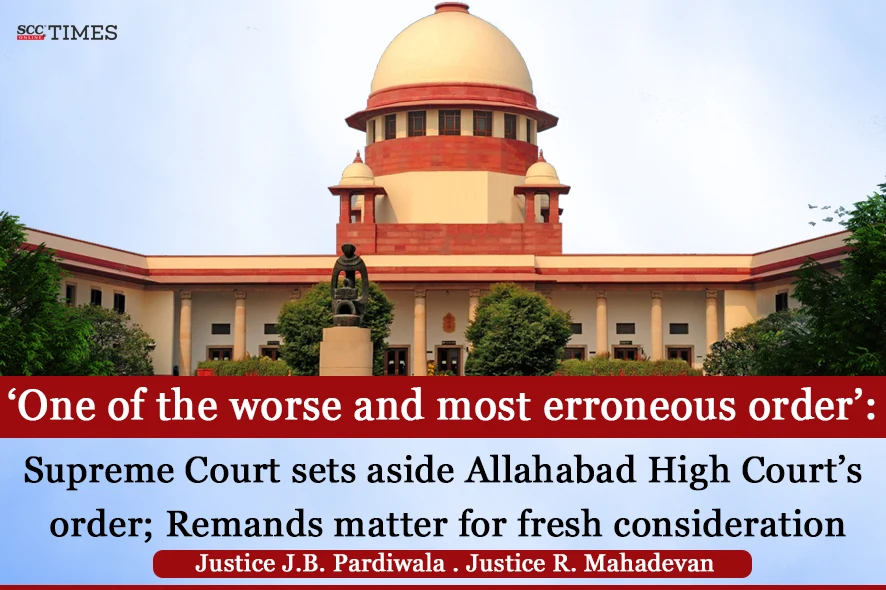Supreme Court: The present petition arose from the order passed by the Allahabad High Court (‘the High Court’), whereby the petitioner’s application to quash the proceedings of complaint case pending in the Court of Additional Chief Judicial Magistrate-I, Kanpur Nagar (‘the Magistrate’) was rejected. The Division Bench of J.B. Pardiwala and R. Mahadevan, JJ., stated that it was expected of the High Court to know the well-settled position of law that in cases of civil dispute, a complainant could not be permitted to resort to criminal proceedings as the same would amount to abuse of process of law.
Thus, the Court set aside the order of the High Court and remanded matter back to the High Court for fresh consideration. The Court requested the Chief Justice of Allahabad High Court to assign this matter to any other Judge of the High Court as he might deem fit and stated that he should immediately withdraw the present criminal determination for the High Court Judge concerned (‘the Judge concerned’).
Background
In the present case, Respondent 2 (‘complainant’) claimed to be an unpaid seller. According to him, he delivered goods in the form of thread to the petitioner worth Rs.52,34,385 out of which an amount of Rs.47,75,000 was paid to the complainant by the petitioner. However, the balance amount was not paid, till this date.
Thus, for the recovery of the balance amount, the complainant filed a criminal complaint and instituted a criminal proceeding. It appeared that the complainant in the first instance tried to lodge a FIR, but the police declined to register the FIR saying that it was purely a civil dispute.
Thus, a private complaint was lodged by the complainant in the Court of the Magistrate, which was registered as Complaint Case. At the end of the magisterial inquiry, the Magistrate concerned thought fit to issue process only for the offence punishable under Section 406 of the IPC. The order passed by the Magistrate while issuing process was challenged before the High Court under Section 482 Criminal Procedure Code, 1973.
The High Court rejected the application vide the impugned order, and thus present petition was filed.
Analysis, Law, and Decision
The Court stated that “with all due deference and humility at our command, we are constrained to observe that the impugned order is one of the worse and most erroneous orders that we have come across in our respective tenures as judges of this Court”. Further, the Court stated that “we are at our wits’ end” to understand what is wrong with the Indian Judiciary at the level of High Court. At times we are left wondering whether such orders are passed on some extraneous considerations or it is sheer ignorance of law. Whatever it be, passing of such absurd and erroneous orders is something unpardonable.”
The Court stated that the Magistrate was expected to know that in a case of sale transaction, where was the question of any entrustment of goods to bring the case within the ambit of criminal breach of trust punishable under Section 406 of the IPC. Further, the High Court was also expected to under the fine distinction between the of cheating and criminal breach of trust, and the necessary ingredients to constitute these two offences.
The Court stated that the Judge concerned had gone to the extent of saying that, asking the complainant to pursue civil remedy for recovery of the balance amount, would be very unreasonable, as civil suit might take a long time before it was decided. Therefore, the complainant should be permitted to institute criminal proceedings for recovery of the balance amount. The Court stated that it was expected of the High Court to know the well-settled position of law that in cases of civil dispute, a complainant could not be permitted to resort to criminal proceedings as the same would amount to abuse of process of law.
Thus, the Court set aside the order of the High Court even without issuing notice to the respondents, and remanded matter back to the High Court for fresh consideration. The Court requested the Chief Justice of Allahabad High Court to assign this matter to any other Judge of the High Court as he might deem fit and stated that he should immediately withdraw the present criminal determination for the Judge concerned.
The Court stated that the Chief Justice should make the Judge concerned sit in a Division Bench with a seasoned senior judge of the High Court. Further, the Court directed the Judge concerned should not be assigned any criminal determination, till he demits office and if at all at some point of time, he was to be made to sit as a single judge, he should not be assigned any criminal determination.
The Court stated that it was constrained to issue such directions, keeping in mind that the impugned order was not the only erroneous order of the Judge concerned, and many such erroneous orders have been looked into by us over a period of time.
[Shikhar Chemicals v. State of U.P., 2025 SCC OnLine SC 1643, decided on 4-8-2025]
Advocates who appeared in this case:
For the Petitioner: Surjadipta Seth, Adv.; Arindam Ghosh, AOR.




